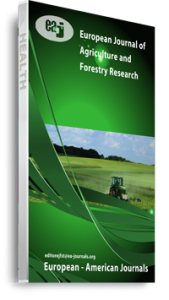Organic agriculture, in addition to supporting environmental sustainability, has been a meaningful way to protect and develop small farming in developing regions. The changes that have occurred within the value chain, such as increases in global standards and the effect of globalisation, have created an increase in both opportunities and risks for smallholders. In the developing countries, mainly on African continent organic agriculture beyond being less researched than in the developed ones, there are constraints related to scale, certification policies, strategies, and the fact that most farmers remain in informal circuits. This paper presents a study of the pepper value chain in São Tomé e Príncipe, which is divided into two categories: certified organic producers, affiliated (Aff) to the Cooperative of Pepper and Vanilla Export (CEPIBA) and non-certified organic pepper, non-affiliated farmers (Naf). The study presents the strategy to promote organic farming through the value chain and a brief comparison among certified and non-certified organic producers. The results showed that Aff perform better than Naf because they have financial stability and apply sustainable practices that are more productive and provide better income, while Naf generally practice subsistence farming with the exception of some medium enterprises.
Keywords: Certification, Environmental, Organic farming, Pepper, Smallholder, Value Chains

